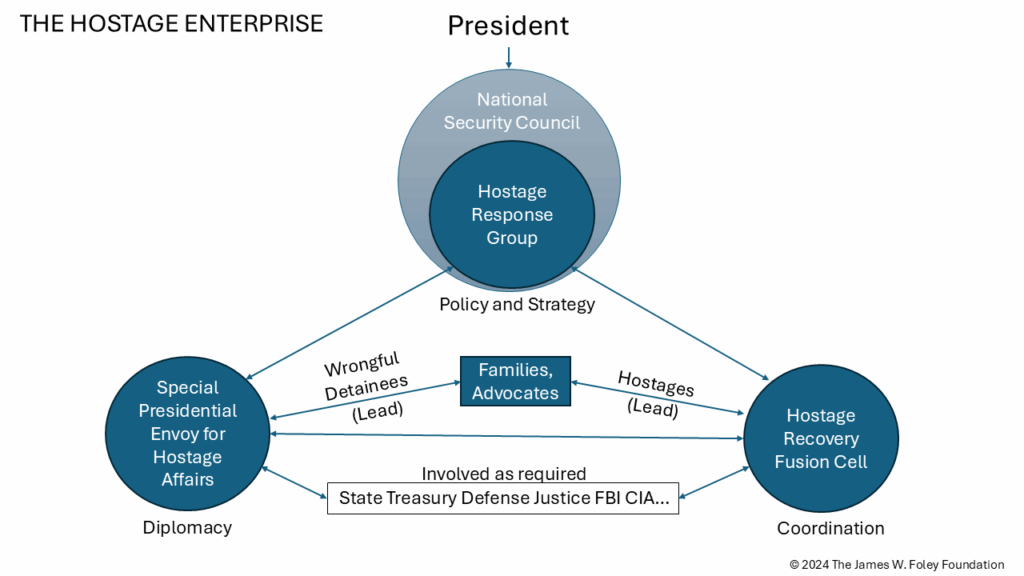Our Advocacy
After James Foley’s unjust detention and killing, and through direct, consistent, and unflinching engagement with the Administration and the media on behalf of hostage families, the Foley Foundation brought about a comprehensive review of the federal government’s response to hostage-taking in 2015 that culminated in the creation of a new government structure, referred to as the “hostage enterprise.”
This structure aims to provide a whole-of-government approach to prioritizing and resolving hostage and wrongful detainee cases.
Today, the Foundation continues to hold the government accountable through its research and public advocacy to ensure the enterprise meets the needs of families with loved ones held hostage or wrongfully detained abroad.

Hostage Advocacy
Advocating for the safe return of Americans unjustly held captive abroad, we:
- Engage directly with families to understand their needs and enlist support from pro bono partners
- Coordinate Congressional advocacy with family advisors as requested
- Develop individual advocacy plans with families requesting it
- Confidentially interview individual families and returned hostages to inform our annual Bringing Americans Home research
Holding the Government Accountable
We hold our government accountable by:
- Serving as a watchdog to ensure our government prioritizes the return of unjustly held Americans
- Pushing the government to engage with families, respond to their requests, and share information transparently and directly
- Proposing and advocating for policy or legislative changes – grounded in our research – to speed the return of hostages and deter future hostage-taking
- Advocating for hostage taking accountability and a comprehensive prevention and deterrence strategy
Research
We conduct independent, widely recognized authoritative research that:
- Serves as a watchdog to ensure our government prioritizes the return of unjustly held Americans
- Pushes the government to engage with families, respond to their requests, and share information transparently and directly
- Proposes and advocates for policy or legislative changes – grounded in our research – to speed the return of hostages and deter future hostage-taking
- Advocates for hostage taking accountability and a comprehensive prevention and deterrence strategy
The Hostage Enterprise
Successful hostage and wrongful detainee advocacy is dependent upon a network of relationships with key individuals and within several institutions. The U.S. government “Hostage Enterprise” is comprised of three primary entities: the Hostage Response Group (HRG) at the National Security Council, the Special Presidential Envoy for Hostage Affairs (SPEHA) at the U.S. Department of State, and the interagency Hostage Recovery Fusion Cell (HRFC).
Within the Legislative Branch, multiple Congressional committees have oversight, policymaking, or appropriation roles that influence the return of U.S. nationals. Member offices should serve as champions for their constituents unjustly detained abroad and/or the family members of American captives.

Special Presidential Envoy for Hostage Affairs (SPEHA)
The Special Presidential Envoy for Hostage Affairs is the lead diplomat for wrongful detainee matters, i.e., US nationals unjustly arrested aboard by nation states. The SPEHA coordinates diplomatic efforts across the DC-based regional bureaus and with relevant U.S. diplomatic missions overseas.
The SPEHA Office has a family engagement coordinator, case managers, external engagement coordinator, legislative advisor, and personnel assigned from interagency partners.
SPEHA supports the HRFC on hostage-taking cases, leading diplomatic efforts. In the Trump administration a Special Envoy for Hostage Response is overall lead for wrongful detainee cases.
In the Trump administration a Special Envoy for Hostage Response is overall lead for wrongful detainee cases.
Hostage Recovery Fusion Cell
The HRFC is an interagency team (housed at and led by an FBI executive) that coordinates efforts to recover U.S. nationals held hostage abroad by non-state actors such as terrorists.
The Cell is comprised of specialists from the Departments of Defense, State, Justice, Treasury; the FBI; and the U.S. Intelligence Community. HRFC develops and coordinates hostage recovery efforts, tracks case developments, shares information with and provides victim support services to families.
HRFC leads international hostage-taking cases and supports SPEHA and Consular Affairs on wrongful detention and international criminal kidnapping cases, respectively.
Hostage Response Group (National Security Council)
The primary national security policymaking and high-level coordination body at the National Security Council (NSC) is the HRG which – like the HRFC – includes representation from all relevant departments and agencies, albeit at a higher decision-making level.
Whereas other structures of the NSC may change dramatically from one Administration to the next, the HRG has retained its basic form across four successive administrations.